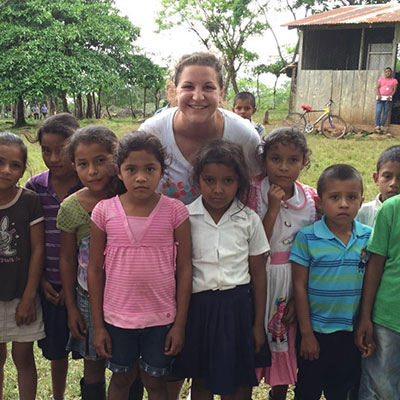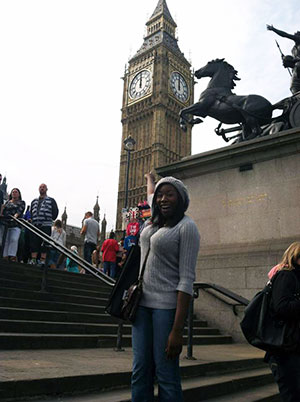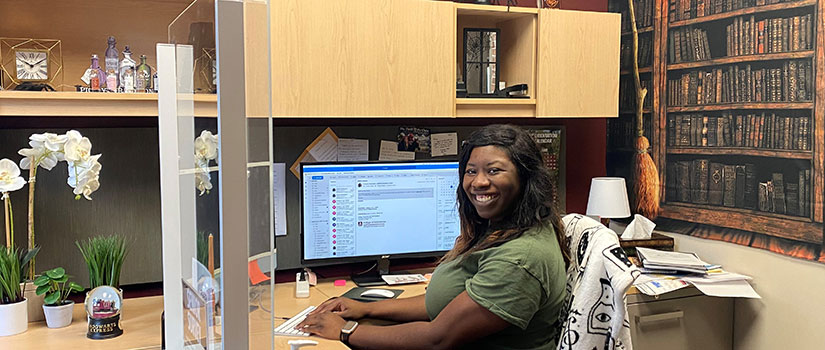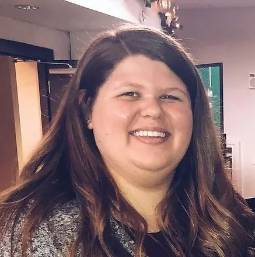Academic advisors play an influential and meaningful role in an undergraduate student’s experience at USC. Advisors are trained in the curricula of their assigned major(s), encourage student participation in beyond the classroom experiences, and help students prepare for their anticipated career post-graduation. For a select group of academic advisors, they can personally relate to the USC student experience. That’s because they were once a USC student in the same major they advise.
“I came in as a transfer student and I was a nursing major at the time. I changed my major [to Middle Level Education] after that first academic year,” said College of Education academic advisor Kathryn Pautz (B.A. Middle Level Education, 2017). “I did go through formal Greek Life recruitment and joined a sorority, which helped the transition as a transfer student. Going through recruitment was helpful in finding my sense of community, because I was also a commuting student that fall semester.”
Biochemistry and Molecular Biology and Physics academic advisor Mia Lacey (B.S. Biochemistry and Molecular Biology, 2022) came to USC as a first-generation student. She shares, “I picked USC on a gut feeling. Loved the campus as soon as I got on it. I was first-generation though, so some things showed very quickly that I wasn’t understanding.”
Now, academic advisors aim to provide undergraduate students with a holistic advising experience, filling in gaps in student information by serving as a point of contact for curricular guidance, campus resources, and beyond the classroom opportunities. Kelsey Ashford (B.A.J.M.C, Public Relations, 2014), academic advisor for the College of Information and Communications, uses her own advising experience to influence her advising approach. “I don't remember [my advising appointment] being like the advising sessions we have now where it's 30 minutes, and you talk about all your academic interests,” Ashford said. “It was me providing the classes to my advisor, because my advisor didn't really know what I was interested in. Now when I meet with my students, I ask them every semester what their interests are, and I'll tailor those interests to their academics.”
Experiential learning opportunities were a significant factor in Ashford’s time at USC. “I knew I wanted to study abroad, and I [was able to] study abroad through a global exchange program at the University of Kent in the UK,” Ashford said.

Pautz also studied abroad through her sorority’s philanthropy organization. “We went to Nicaragua and funded and built a school. I used this experience as my beyond the classroom connection for Graduation with Leadership Distinction, focusing on education abroad and equitable education for others.”
Current students don’t have to leave the country to find experiential learning opportunities. Students can choose from a variety of clubs, student organizations, and programs like undergraduate research. For School of Visual Art & Design academic advisor Della Bryant (B.A. Media Arts, 2020), her participation in clubs and internships as an undergraduate student helps her provide the best guidance to her advisees. Della shares, “[My degree in Media Arts from USC] helps when we get to the internship phase when students need to find an internship. I know what companies are close by and what programs are offered.”
Lacey participated in undergraduate research with Dr. Natalia Shustova and says undergraduate research was one of her most memorable moments at USC. “One of the most memorable things that really happened to me was starting undergraduate research my sophomore year,” Lacey said. “I don't think I was very confident in my major until I got [that] experiential learning opportunity.” Lacey also shares her undergraduate research experiences with her advisees. “I try to get my students in research as soon as possible. If you want to know if you're really interested in your major, you should do something that's hands on. You can talk about how you want to do research; you have no idea what it's like until you do it. I did research and I enjoyed it, but it's not something I wanted to do for rest of my life, and I was able to see that.”
Pautz did pursue a career in classroom teaching and after 6 years in the classroom decided to transition back to her alma mater as an academic advisor. She says her time in the classroom has influenced her advising philosophy and approach to working with USC students. “I think the one big thing that stood out to me [about advising] is the student interaction piece, which I enjoyed about teaching. Student success and student advocacy is very important to me, along with making sure students really know what their university has to offer, especially if they're coming from different student populations.”

Ashford uses elements from her Public Relations degree in her role as an academic advisor. She said, “My background in Public Relations has taught me how to strategically communicate with people. So, when I reach out to my students with information, I know how to format it, how to verbalize it in a way where it makes sense.”
Exploratory Advisor Jay Pou (B.A. Journalism, 2005) assists students in changing their majors between colleges/schools and was once a change of major student himself. He shares, “I have been here a long time so I can help [students] connect the dots in a way that maybe you can't do just by looking at web pages.”
Perhaps the biggest benefit for advisors who’ve experienced USC as an undergraduate student is the ability to offer their advisees some “lessons learned.” Ashford said her biggest piece of advice for students is “your degree, what you receive on paper, is not indicative of the career that you're going to go into.” She often shares her personal story with students as an example of how your degree can influence your career post-graduation. “When I originally got into public relations, I thought I was going to work for a PR agency or be someone's publicist. I'm not. Not yet anyways, but I did end being a digital content creator, which is the entrepreneurial side that I do outside of work.”
Pautz wants her students to enjoy their undergraduate experience without sweating the small stuff. “It's very easy to get caught up in the future, like this is what I need to do [to graduate], but really embrace the moment. Embrace your time here. I tell a lot of my students that are considering trying to finish their degree early, it's your four years and you're never going to get them back.”
Pou offers students more practical advice. He says, “I didn't live on campus. I'm from an hour away and I had three best friends coming here. We decided to just get an apartment in West Columbia. But, I kind of missed out on that first year [when people make connections in the dorm].” Bryant also lived off campus her first year and highly recommends students live on campus. Pou and Bryant also agree on the importance of taking University 101. “I still advise students to take University 101,” Bryant said. “Just because it is really beneficial, especially if you're not on campus.”
By sharing their personal academic journeys, these advisors can encourage their advisees and show that success post-graduation can be achieved, with a little hard work and encouragement from your academic advisor.
“I don't know what it's going to look like for you, but I can promise you that if we follow this through to the end a put our full self into it, it's going to lead to a good result,” Pou says. “I've seen so many people do it, it'll work for you too.”
In addition to the advisors in this article, USC employs many alumni from a variety of majors and disciplines as academic advisors. Former alumni who are now advisors include Phillip Blackwell (CAS- Biological Sciences), Shannon Blake-Lynch (CIC), Caitlyn Brockington (CAS-Psychology), Brandi Byers (CAS- Chemistry and Mathematics), Latecia Cobbs (Nursing), Alexa Dean (CAS- Earth, Ocean, and Environment), Art Farlowe (CIC), Moeshia Holmes (MCEC), Courtney Godwin (Exploratory Advising), Deanie Kane (CAS- Criminal Justice), Neal Kolnik (Public Health), Sophie Legare (CAS-Psychology), Najja Lyle (MCEC), Shaina Manuel (CIC), Sabrina McClure (CIC), Tyler McNamara (CAS-History), Edward Morris (CAS- Political Science), Wanda Mujica (MCEC), Carol Randazzo (CAS- Psychology), Joey Reed (DMSB), Hannah Shikle (CIC), Kate Snelson (MCEC), Brittany Sparks (CAS- Visual Art & Design), Carrie Turner (MCEC), and Kate Weaver (DMSB).

